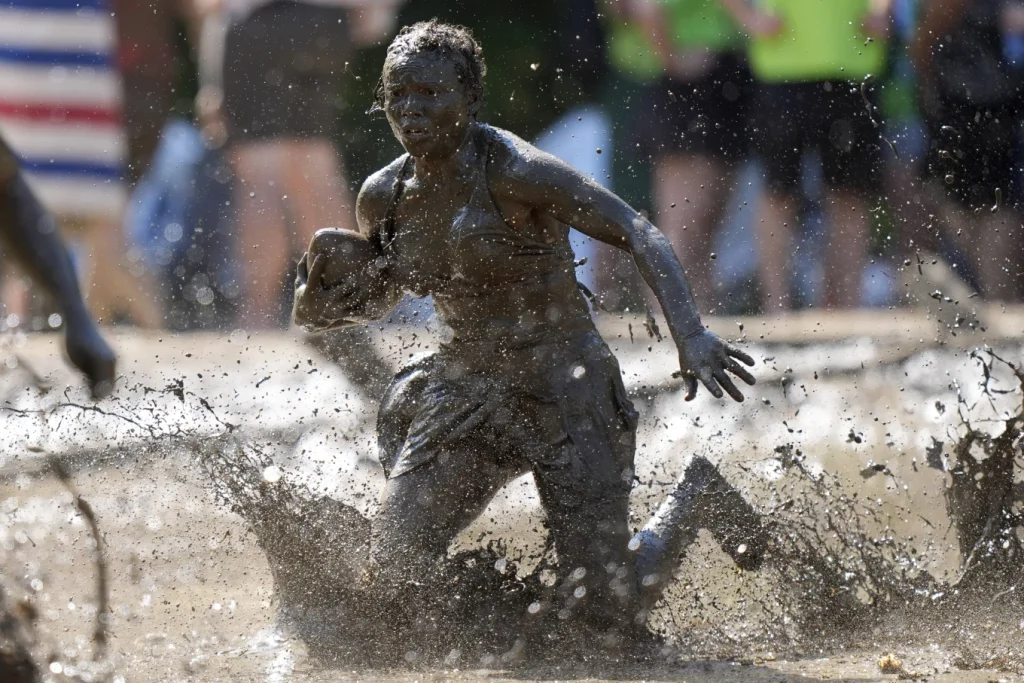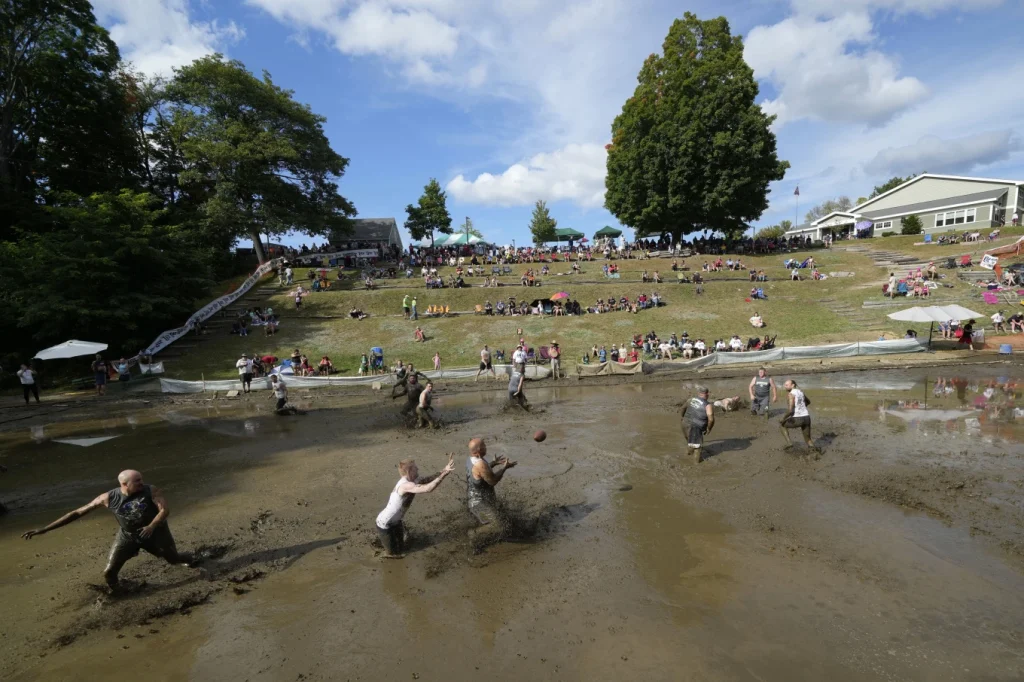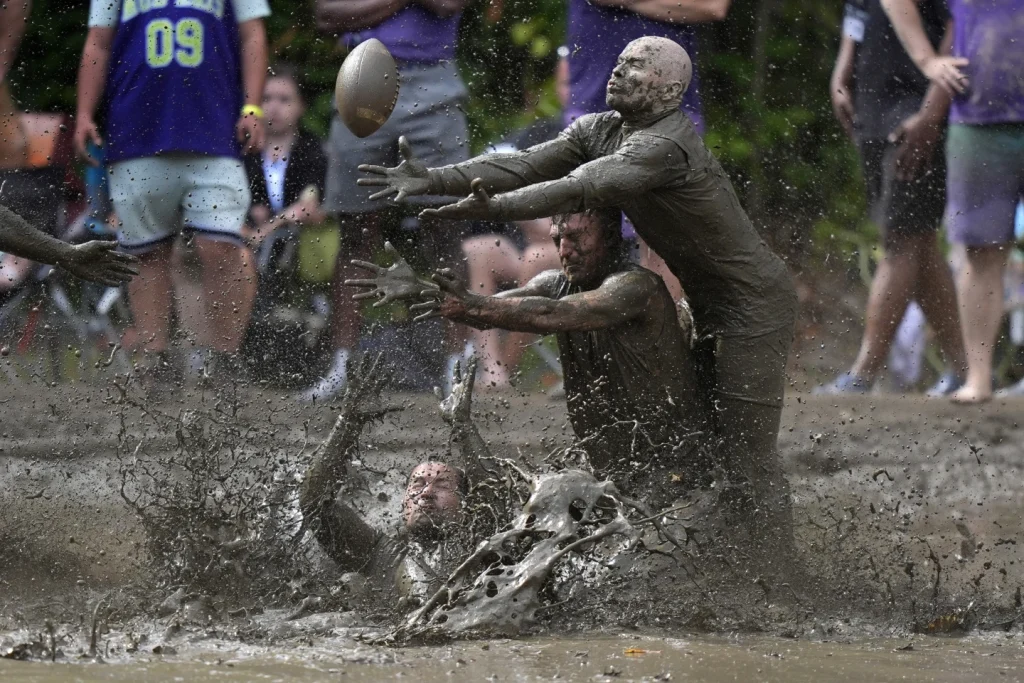In the realm of organized sports, various competitions stand out due to their level of professionalism, commercial success, and polished presentation.
College football players eagerly anticipate bowl games, while professional players often aspire to step onto the grand stage of the Super Bowl.
However, nestled in the idyllic landscapes of northern New Hampshire lies a unique event that diverges significantly from the conventional norms of competitive sports: the esteemed Mud Bowl.
This annual gathering, recently commemorating its 50th year, not only symbolizes the spirit of athleticism but also encapsulates the essence of camaraderie, community, and pure joy that transcends the formalities of traditional sporting events.
As participants engage in a gladiatorial contest within the confines of what is graciously termed “Hog Coliseum,” they inevitably recognize that muddy conditions provide a fresh and unexpected layer to the game of football.
The Mud Bowl is not merely an athletic event; it is a testament to the celebration of amateur sport and the unrestrained enjoyment that emerges from playing in chaotic, unrefined environments.
As articulated by Jason Veno, the dedicated quarterback of the North Country Mud Crocs, mud serves as an equalizing force in the game, ensuring that performances are not dictated solely by skill or training.
“It’s just a different game in the mud,” he remarked, underscoring the intrinsic value of equality that such conditions facilitate among players of varying abilities.
The Mud Bowl provides a unique canvas upon which tensions of competition are lightened by the sheer pleasure of messiness.
The philosophical underpinnings of the event can be encapsulated in the joy of play; as participants trudge through knee-deep muck, they embrace an experience that transports them back to their childhood—a time when sports were fundamentally about fun, not financial gain.
For many, such as Ryan Martin, who has been partaking in the Mud Bowl festivities for nearly two decades, the event cultivates a rare opportunity to reconnect with friends and relive shared memories that are inextricably linked to their younger, more carefree selves.
Martin aptly captures the essence of the Mud Bowl, saying, “You get to a point where you’re just like, I’m not going pro on anything, I might as well feel like I’m still competing day in and day out.”
Amidst the muddy chaos, the participants exhibit a relentless spirit that reveals itself not only in their competitive pursuits but also in their unwavering commitment to enjoyment and community building.
Mahala Smith’s journey from childhood football enthusiasm to participation in women’s tackle football before stepping into the Mud Bowl encapsulates the inclusive nature of the event.
Smith’s perspective underscores the event’s emotional richness: “It’s like a little mini vacation, and everyone’s all friendly.” The casual nature of the event promotes bonding among participants, exemplifying the notion of shared experiences that foster long-lasting friendships.
As players gather around campfires or share stories at local restaurants post-game, the essence of community flourishes, transcending the muddy battlefield that initially brought them together.
The Mud Bowl is not solely a whimsical departure from the ordinary; it is a grand celebration of resilience and comradery through adversity.

Even as players grapple with the challenges of the muddy terrain—inevitably finding mud in unexpected places—the atmosphere remains buoyed by laughter and a shared appreciation of the silliness inherent in their muddy endeavors.
The two-hand touch format, while competitive, invites moments of friendly rivalry that contribute to the overall jubilant spirit of the event.
Players who have once graced the fields of high school and college athletics, and even a selection of retired professionals, come together to revel in the simplicity and joy of sport stripped of commercial imperatives.
The thematic celebration of “50 Years, The Best of Five Decades” further enriches the Mud Bowl narrative. As the event has evolved over the years, it has simultaneously harnessed a philanthropic aspect, having raised over $1 million for charitable causes.
This dual legacy underscores and emphasizes the importance of community engagement, transforming what could have served solely as a jovial competition into a vehicle for social responsibility.
Moreover, it illustrates how passionate local traditions can solidify communal bonds while contributing positively to larger societal interests.
Thus, the Mud Bowl embodies a potent juxtaposition to the mainstream portrayal of competitive sports. It serves as a reminder that the very essence of sporting endeavors can and should extend beyond the confines of elite competition.
The enduring popularity of the Mud Bowl is a testament to humanity’s inherent craving for connectedness, joy, nostalgia, and the exploratory spirit that defines play.
As college football players look toward bowl games and professionals set their sights on the Super Bowl, the Mud Bowl continues to thrive, encapsulating the simple bliss of getting muddy with friends, celebrating life through sport, and fostering a sense of belonging that endures well beyond the muck.
In a world that often prioritizes winning and performance metrics, the Mud Bowl emerges not merely as an event, but rather as a cherished cultural artifact that invites reflection on the role of play in our adult lives.

The Mud Bowl’s 50th anniversary represents a remarkable celebration of both sports and community spirit. As highlighted in your piece, the event successfully blends competitive spirit with a sense of camaraderie among players and attendees alike.
The unique environment of playing football in knee-deep mud not only levels the playing field but also evokes a sense of nostalgia, allowing participants to reconnect with their youthful exuberance.
The additional insights shared by players like Jason Veno and Mahala Smith underline the importance of this event as more than just a tournament; it serves as an annual gathering that fosters friendships and communal enjoyment.
Furthermore, the charitable contributions made over the years reflect the event’s commitment to giving back to the community. The Mud Bowl is certainly a testament to the joy that can be found in the simplest of pleasures, and I commend the organizers for preserving this tradition for half a century.
